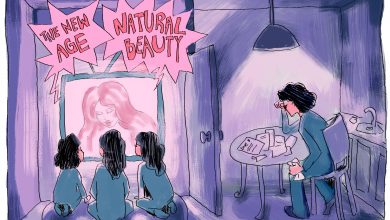Buy This, Not That: Harnessing Your Purchasing Power

Image by mary-troublemaker via Pixabay / CC BY 2.0.
Let’s talk about stuff.
To be clear, I don’t mean “stuff” like the tasks scrawled on your to-do list or the thoughts tumbling around in your head. Instead, I mean the literal junk in the trunk of your car, the eighteen coffee mugs you somehow came to own, and the items filed away in your closet that you never really wear, but still can’t bear to give away. (Don’t worry, I’m right there with you).
In an America that faces unprecedented levels of uncertainty, any power we have is power we must harness. So let’s talk about purchasing power. We all want to put our money where our mouths are (and in doing so, align our purchases with our politics). But what does it mean to be a conscious consumer while also balling on a minuscule budget?
It would be impossible (not to mention exhausting) to examine every problematic company and cruel corporation in the world, so I’m going to highlight what I consider the Big Four: four companies that masquerade as “cool” and “convenient,” but actually contribute to human rights violations, environmental degradation, and other global concerns.
_____
- Driscoll’s
Driscoll’s, the nation’s largest supplier of berries, has long been the center of a tumultuous labor dispute. The agricultural industry at large is already guilty of exploiting farmworkers; in Driscoll’s case, this scenario is exacerbated by the fact that its workforce is mostly comprised of undocumented (and therefore legally vulnerable) workers from Oaxaca, Mexico.
In the summer of 2016, three years into the dispute, Driscoll’s employees called for a consumer boycott of all berries picked, packaged, and distributed by the company. Their request for union representation for seasonal farmworkers has yet to be granted.
But fear not! While Driscoll’s supplies virtually 100 percent of the berries carried in chain stores such as Ralph’s and Target, other options await you. Head to the UCLA Farmer’s Market in Bruin Plaza (Wednesdays from 2p.m. – 6p.m.) or the Westwood Farmer’s Market on Broxton Avenue (Thursdays 12p.m. – 6p.m.) to support local farmers and reduce produce transportation emissions, all while getting your antioxidant fix. If you don’t live near a farmer’s market or find the prices steep, frozen berries pack just as much of a punch and are available at stores such as Target, Trader Joe’s (which also has non-Driscoll’s fresh berries), and the 99 Cent Store.
- H&M
We live in a world of imperfect news coverage, where media outlets tend to focus more on tropes than travesties. Even if a piece of information does make it onto the newsdesk and subsequently the television screen, it’s unlikely to be given a second segment — even if the issue remains pertinent. Such was the case with the tragic fire that erupted in one of H&M’s Bangladeshi factories in 2010. In response to the fire and the 21 lives it claimed, H&M signed the Clean Clothes Campaign, vowing to improve factory conditions and safeguard against further tragedies. However, the company is far behind schedule on its promised renovations; another fire broke out in a Bangladeshi H&M/JCPenney factory in February 2016.
Though H&M might be the most obvious option for affordable clothing, there are actually a plethora of options for the feminist fashionista. Try Poshmark for scoring (and selling) brand-name pieces at jaw-dropping discounts, Etsy for collecting one-of-a-kind clothes, or Everlane for knowing exactly where your clothes come from thanks to their “radical transparency” policy.
If you choose thrift shopping as your H&M alternative, just be sure to acknowledge that not all thrift stores are created with marginalized communities in mind: In recent years, the Salvation Army has come under fire for supporting anti-LGBT lobbies, though they have since released a statement insisting otherwise. Additionally, be mindful of the fact that while your thrifty shopping habits might help a business flourish, the glorification and gentrification of thrift shopping also has the potential to divert resources away from working-class individuals and communities who need low-cost clothing, furniture, and appliances.
- Nestlé
It feels as if Nestlé has been the ultimate “cruel corporation” for eons — and still, it has done virtually nothing to phase out its slavery and child labor practices, limit its water usage during an unprecedented Californian drought, or remedy any of its other many scandals. Unfortunately, Nestlé’s exploitative tactics go far beyond chocolate: The company is the “global leader in foodstuffs,” which is a fancy way of saying that they produce just about everything, everywhere. Baby food? Nestlé. Bottled water? Nestlé. Those UCLA gummies they handed out at the most recent basketball game? You guessed it: Nestlé.
So what’s a person to do? While we can’t provide you with a list of every Nestlé and non-Nestlé product, what we can do is warn you that Nestlé, like a lot of dominant international corporations, is sneaky, so you may need to do a bit more investigation during your regular shopping trips. A few helpful strategies are to read product labels and check box tops, buy dry goods like rice and nuts from grocery store bulk bins instead of pre-packaged bags on store shelves, and invest in a reusable water bottle instead of buying Nestlé plastic bottles.
Oh, and on the chocolate front? Try Theo, Rescue Chocolate, and Justin’s. Alternatively, if you’re really feeling inspired, try out this homemade chocolate recipe.
- Amazon
For individuals struggling not to break the bank, this one is a real doozy: Amazon, even with its tantalizingly free Student Prime accounts and oh-so-convenient overnight shipping, is an ultimate #problematicfave. Once you peel away the intoxicating appeal of convenience and cost-effectiveness, you unearth a corporation guilty of employee bullying and intimidation, of suffocating independent bookstores and subsequently stealing the successful, independent model for itself, and of treading an enormous carbon footprint.
If buying online is your absolute lifeblood, you’ve still got options. Though none of them are perfect, Rakuten, eBay, and IndieBound offer better alternatives.
_____
While I might have just shattered your perceptions of these four companies, I hope I didn’t shatter your spirit. There are companies doing seriously cool stuff for seriously affordable prices. Additionally, when dealing with a company as large and pervasive as the Big Four listed here, it’s important to do more than divert your individual funds: try writing letters, recruiting friends, and using your voice (not just your wallet) to demand change. As we move forward in this season of reclaiming our country and our bodies, let’s also reclaim our consumer habits. Here’s to radical love and righteous purchasing!




